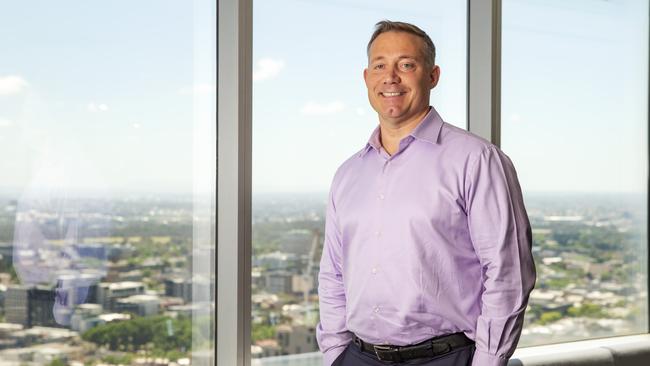Artificial intelligence will boost demand for data centres: IFM Investors
The growing use of artificial intelligence will boost global demand for data centres, IFM Investors’ global head of infrastructure, Kyle Mangini, has predicted.

The growing use of artificial intelligence will boost global demand for data centres, IFM Investors’ global head of infrastructure, Kyle Mangini, has predicted.
“The big increase in use of artificial intelligence means that data centres are growing exponentially,” Mr Mangini told The Australian, on the release of a report on the outlook for infrastructure investment in 2024.
“There are huge investments being made in data centre capacity, largely driven by AI.
“New data centres are being rolled out as quickly as the market can keep up.”
Mr Mangini said the big increase in demand for data centres was also adding to the demand for renewable energy to supply the new centres, which are energy-intensive.
He said many owners of data centres, including IFM, wanted to have them powered by green energy. “The data centres we own are completely powered by renewable energy,” he said.
A long-time investor in the infrastructure sector, IFM manages more than $100bn worth of infrastructure assets in about 40 assets across 20 countries.
IFM and its US partner, digital infrastructure investor DigitalBridge, bought New York Stock Exchange-listed data centre operator Switch, one of the largest operators of private data centres in the US, in late 2022 in a deal worth $16bn.
Announcing that deal, IFM said the Las Vegas-based company was planning to spend as much as $10bn to roll out more data centres.
Mr Mangini said he expected to see major investment in new centres in the US, but said the trend was occurring around the world as the use of AI expanded.
The report says the energy transition will be another major factor driving future investment in infrastructure.
“If the numbers are correct, the energy transition will be the biggest investment program which any of us have ever seen in our careers,” Mr Mangini said.
He said the US Inflation Reduction Act passed by the Biden administration was proving a major impetus to infrastructure investing in the US around the energy transition.
“It is one of the most successful pieces of legislation I have ever seen in terms of encouraging people to invest quickly right across the spectrum,” he said. “Other governments are scrambling to work out how to respond to it.”

A recent example is a $US90m ($138m) investment by the US government in a solar-powered project in Pennsylvania on land from a reclaimed mine that is being undertaken by a subsidiary of IFM’s US-based renewable energy company, Swift Current Energy. In a deal announced this week, Swift’s subsidiary, Mineral Basin Solar Power, was given funds by the US Department of Energy for the project, which will use the reclaimed land for the solar project that the company says will produce enough electricity to power at least 70,000 homes in the area.
Australian and Canadian superannuation funds have been early investors in infrastructure, with investors in the US slower to see it as an asset class in its own right. But Mr Mangini said infrastructure investment was now being recognised as its own asset class by a broader number of investors – particularly in the US, where major investors had tended previously to relegate it to being an “alternative” asset.
He said this was evidenced by the recent purchase of Global Infrastructure Partners by US investment giant BlackRock, a deal announced in January.
GIP is the world’s largest independent infrastructure manager with more than $US100bn in funds under management. Announcing the deal, BlackRock said the infrastructure market was worth about $US1 trillion and was forecast to be one of the fastest-growing segments of private markets over the next few years.
It said this was being driven by long-term structural trends, including increasing global demand for upgraded digital infrastructure such as data centres, fibre broadband and mobile phone towers. It said there was also a need for renewed investment in logistical hubs such as airports, railroads and ports as supply chains were “rewired”, as well as investments in decarbonisation and energy security.
Mr Mangini said many US investors were moving out of commercial property and were looking at investing in infrastructure. “American investors were relatively late to come to this as an asset class,” he said.
“If you look at major Australian funds, they will often have 10-15 per cent allocation to infrastructure with some of the Canadian funds having as much as 20 per cent.
“But the BlackRock deal shows it is really stepping up behind this asset class and saying this is the future.”
He said this was beneficial to IFM as it had been a long-term investor in infrastructure, with more than $100bn in the sector.
He said infrastructure had proved its “resilience” as an investment during the recent years of market volatility driven by higher inflation and rising interest rates. “The resilience of infrastructure returns has been in the spotlight due to recent market volatility, and investors around the world are starting to catch on to what IFM’s known for almost 30 years – infrastructure should be treated as a portfolio cornerstone,” he said.
“We’re at a convergence point where the asset class is starting to become mainstream, with inflows and deal competition ramping up, and a massive opportunity set emerging through the global energy transition.
“It’s a really exciting time for the sector.
“IFM led the emergence of the infrastructure asset class in the 1990s, and we think with the current market conditions and investment opportunities, the first-mover advantage that led to strong returns for Australian and Canadian investors 30 years ago is back and available for global investors today.”







To join the conversation, please log in. Don't have an account? Register
Join the conversation, you are commenting as Logout